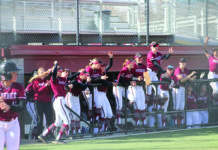Coaching during the off-season isn’t your typical grind—the early workouts, long weekends and sweat and tears while trying to bring your team to a national championship—but instead it creates, even more, time for coaches to never stop being a coach.
“It just changes from in-season to recruiting to out-of-season workouts,” Head football coach Russ Martin said. “That’s one of the things as coaches, it’s a cycle but it’s exciting because it is always changing.”
A large focus for coaches during the off-season is spending time searching and recruiting players for upcoming years. Recruitment opens many avenues for coaches to find athletes such as video submissions, scouting club tournaments or sporting events, calling or video-chatting, recruitment websites and YouTube videos.

“It’s always different and you never know if players may become injured and not come back or you have players that just don’t come back and it can throw a wrinkle but it’s something every coach is used to,” head women’s basketball coach Taylor Wagner said. “The big thing is you have to find the kids. There are certain states we recruit out of most and follow what goes on in those states.”
Most sports begin to contact athletes as they approach their senior year of high school with a lot of recruitment focus on Colorado, Utah, Nevada, Wyoming, Arizona, Idaho and California.
“When I came here I wanted to be the premier school in the region,” Martin said. “Therefore, we recruit Colorado very hard, and we recruit Arizona, California, Utah, and Wyoming. We go through an evaluation period in the fall, and continue contact the following November, December and January—that’s how it all falls into place.”
Sports, like tennis, recruit international athletes from places like Sweden or Venezuela that send videos in and have contact through Skype calls.
“It’s not as expensive,” Head tennis coach Dan MacDonald said. “People don’t understand most international athletes don’t have a chance to compete in their countries and don’t have college athletics like we do. They have club teams, but they don’t travel and compete and do the things we do.”
Going hand-in-hand with recruitment, many coaches at Colorado Mesa University take on extra coaching opportunities and hold individual or team-oriented camps during the summer for their sport that draw attention from athletes of every age. Golf and Tennis coaches often teach at different facilities like the indoor tennis facility in Grand Junction or teach lessons on the side.
“Sports like golf and tennis have unique rules,” MacDonald said. “Most coaches can run camps but only for a certain amount of time, usually during the summer. They can’t train sophomores, juniors and seniors in high school but I can if I make it available to everyone in the vicinity. It is good for the community and is a nice way to have good tennis community atmosphere.”
Coaches also must find ways to fundraise money for their program and scholarships, market their program and find ways to give back with community service. The football program generates 1,000 plus hours of community service each year.
“That’s part of the whole building process,” Martin said. “I think society will show that football, in particular, is a standpoint that it is a front window to a university and I think it’s important as a head football coach that I am around the community and the alumni to help raise money for the university and program. I’ve been around programs that have been highly successful and it’s amazing how it draws people in and erases a lot of other borders, not only for the community but for generational settings.”
On top of fundraising, coaches must determine finances for the program each year, season scheduling and work out plans. When they aren’t coaching, they try to spend time with family, travel or participate in recreational activities like fishing.
“I take downtime coaching my daughter’s basketball team, going out with my wife or family,” MacDonald said. “You have to find a happy balance in life. Most coaches, whether the community, the president or athletic director sees it, the pressure to succeed within these people are high. They don’t become a head coach by not putting pressure on themselves and wanting to succeed.”



